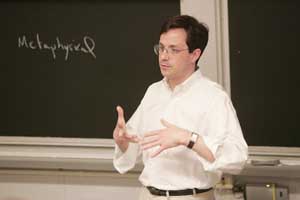Michael Green, Assistant Professor in Philosophy
By Seth SandersNews Office
 Michael Green | |
The first thing a visitor to Michael Green’s online journal, or Web log, (http://humanities.uchicago.edu/faculty/mgreen) might notice is the quality of the criticism—not of others, but of Green’s own ideas—which he posts along with interesting statements that arise in his classroom.
As a result, his students become part of a discussion in a new way, and readers all across the world can see how they have contributed to an ongoing discourse.
Green, an Assistant Professor in Philosophy and a member of the Human Rights Program, explained that though the Web log is just a technological tool, it reflects something essential. “I’m not the only one in the classroom who matters or who’s contributing. A class isn’t good if I just deliver an organized lecture full of interesting points. It’s only good if the students have gotten something out of it and are involved in learning. Ideally, it is an interaction that works on both sides rather than just one person delivering a talk.
“I’m very conscious of the fact that it’s really hard to listen to someone in a room for an hour and a half. Listening to academic papers makes me aware of how hard it is to process all that information and use what you’ve heard. But that’s what students have to do all day. I try to adopt methods that take that into account—breaking up lectures with funny or just stupid things, knowing names, being able to talk with people in a lecture, allowing students to make the points.”
Green’s online course notes often include students’ ideas and arguments; while teachers have long recognized that students collaborate in learning, putting these notes online adds a dimension to a class. “Having the discussions become a part of the official record is an extremely cool thing. For example, in a paper I was working on about Hobbes, I realized that something a graduate student had said in a seminar a few years ago, which I thought was wrong at the time, was actually on the right track. I was able to find that comment in the online notes and acknowledge that he was right.”
Green received his A.B. from the University of Michigan in 1989 and his Ph.D. from the University of California, Berkeley in 1997. He joined the Chicago faculty in 1999, and in 2002, he was awarded a Residential Faculty Fellowship at the Franke Institute for the Humanities. He focuses on ethics and political philosophy, having published and delivered papers on justice, nationalism, Thomas Hobbes and David Hume’s theory of personal identity.
“Course preparation was how I got into Hobbes in the first place. I was hired to do a history of political thought from Luther to the 19th century, so I naturally spent all summer preparing on the one thinker I really knew something about, Hobbes, which was an irrational way to prepare, but I got really interested in it and found problems I thought I could solve. So I fell into the research project that’s given me the most joy in my first teaching job; in fact, most things in my career have been led by my teaching.”
![[Chronicle]](/images/sidebar_header_oct06.gif)